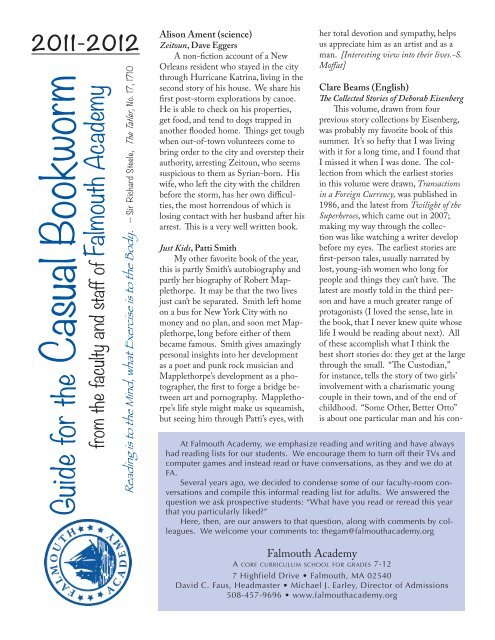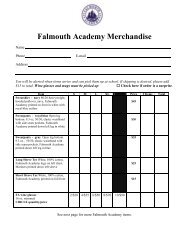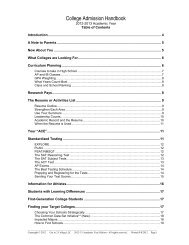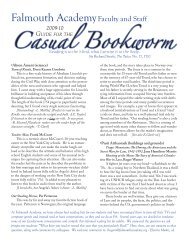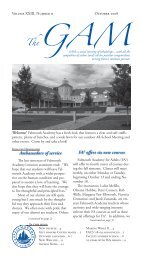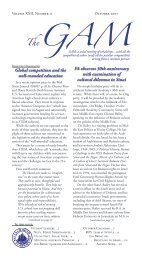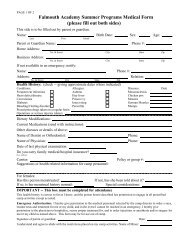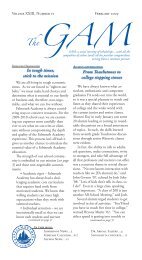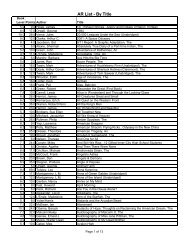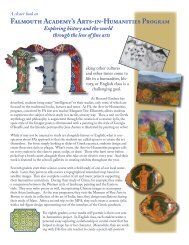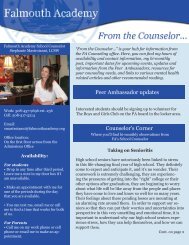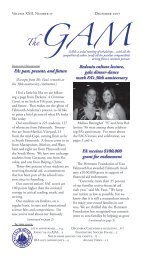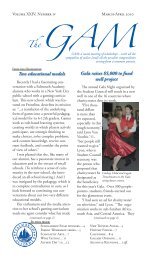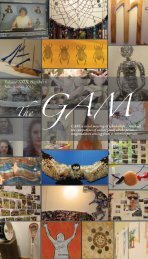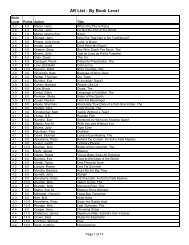Create successful ePaper yourself
Turn your PDF publications into a flip-book with our unique Google optimized e-Paper software.
2011-2012Guide for the <strong>Casual</strong> <strong>Bookw</strong><strong>orm</strong>from the faculty and staff of <strong>Falmouth</strong> <strong>Academy</strong>Reading is to the Mind, what Exercise is to the Body. -- Sir Richard Steele, The Tatler, No. 17, 1710Alison Ament (science)Zeitoun, Dave EggersA non-fiction account of a NewOrleans resident who stayed in the citythrough Hurricane Katrina, living in thesecond story of his house. We share hisfirst post-st<strong>orm</strong> explorations by canoe.He is able to check on his properties,get food, and tend to dogs trapped inanother flooded home. Things get toughwhen out-of-town volunteers come tobring order to the city and overstep theirauthority, arresting Zeitoun, who seemssuspicious to them as Syrian-born. Hiswife, who left the city with the childrenbefore the st<strong>orm</strong>, has her own difficulties,the most horrendous of which islosing contact with her husband after hisarrest. This is a very well written book.Just Kids, Patti SmithMy other favorite book of the year,this is partly Smith’s autobiography andpartly her biography of Robert Mapplethorpe.It may be that the two livesjust can’t be separated. Smith left homeon a bus for New York City with nomoney and no plan, and soon met Mapplethorpe,long before either of thembecame famous. Smith gives amazinglypersonal insights into her developmentas a poet and punk rock musician andMapplethorpe’s development as a photographer,the first to forge a bridge betweenart and pornography. Mapplethorpe’slife style might make us squeamish,but seeing him through Patti’s eyes, withher total devotion and sympathy, helpsus appreciate him as an artist and as aman. [Interesting view into their lives.-S.Moffat]Clare Beams (English)The Collected Stories of Deborah EisenbergThis volume, drawn from fourprevious story collections by Eisenberg,was probably my favorite book of thissummer. It’s so hefty that I was livingwith it for a long time, and I found thatI missed it when I was done. The collectionfrom which the earliest storiesin this volume were drawn, Transactionsin a Foreign Currency, was published in1986, and the latest from Twilight of theSuperheroes, which came out in 2007;making my way through the collectionwas like watching a writer developbefore my eyes. The earliest stories arefirst-person tales, usually narrated bylost, young-ish women who long forpeople and things they can’t have. Thelatest are mostly told in the third personand have a much greater range ofprotagonists (I loved the sense, late inthe book, that I never knew quite whoselife I would be reading about next). Allof these accomplish what I think thebest short stories do: they get at the largethrough the small. “The Custodian,”for instance, tells the story of two girls’involvement with a charismatic youngcouple in their town, and of the end ofchildhood. “Some Other, Better Otto”is about one particular man and his con-At <strong>Falmouth</strong> <strong>Academy</strong>, we emphasize reading and writing and have alwayshad reading lists for our students. We encourage them to turn off their TVs andcomputer games and instead read or have conversations, as they and we do atFA.Several years ago, we decided to condense some of our faculty-room conversationsand compile this inf<strong>orm</strong>al reading list for adults. We answered thequestion we ask prospective students: “What have you read or reread this yearthat you particularly liked?”Here, then, are our answers to that question, along with comments by colleagues.We welcome your comments to: thegam@falmouthacademy.org<strong>Falmouth</strong> <strong>Academy</strong>A core curriculum school for grades 7-127 Highfield Drive • <strong>Falmouth</strong>, MA 02540David C. Faus, Headmaster • Michael J. Earley, Director of Admissions508-457-9696 • www.falmouthacademy.org
nections to his siblings and his partner, but also aboutthe way cruelty can flourish in the closest relationships. Ithought this was a wonderful book.Like You’d Understand, Anyway, Jim ShepardAnother story collection. I loved this one, too.Shepard is a master of first-person voices, and there’san incredible, exuberant variety of those voices here.These stories are narrated by, among others, Aeschylus, aRussian female astronaut, a soldier on Hadrian’s Wall, amodern high-school football player, and the chief executionerof Paris during the French Revolution. That laststory, “Sans Farine,” was perhaps my favorite, just for theway history and humanity collide in its narrator: “Youwant to know—all France wants to know—what takesplace in the executioner’s mind…Does he eat? Does hesleep? Do his smiles freeze the blood?...Becoming shrill,my wife calls it, whenever I get too agitated in my owndefense.” Highly recommended.Deborah T. Bradley (French)Island Beneath the Sea, Isabel AllendeIsland Beneath the Sea takes the reader from Haiti toLouisiana in the mid to late 18th century, portraying thedecline and decadence of French colonial domination inboth territories. The central character is a slave sold intoa colonial domaine as a child, a richly created and deeplycourageous woman of the sort that Allende has developedin each of her mature novels. Allende’s women,typically set in horrifically abusive situations, restoreone’s faith in the human spirit despite all odds. On thehistorical level, I found the multinational exploration ofthe issue of slavery–in France leading up to the time ofthe Révolution, in the Louisiana Purchase (not yet purchased)and in the United States–particularly inf<strong>orm</strong>ativeand thought provoking. Floating above it all shinesa dream, a hope, a voyage of the spirit to that IslandBeneath the Sea. [I read this book last year in Spanish andrecommend that anyone who can read it in its original f<strong>orm</strong>do so. Allende’s lyrical and beautiful prose lessens the horrifyingimpact of slavery, violence against women, and incest.Not my favorite book of hers, but a must read. -C. Pingal]The French Gardener, Santa MontefioreDid you love The Secret Garden? One might describeThe French Gardener as an adult version of the children’sbook, filled with lovely descriptions of a neglected gardenbrought back to life by gentle, loving hands. This garden,like that of Frances Hodgson Burnett, also holds the livingspirits of loved ones – and lovers. But most beautifully,the novel celebrates the transf<strong>orm</strong>ative power of the2earth and the things that grow upon it in the stewardshipof people who love nature and each other.Caleb’s Crossing, Geraldine BrooksI’m sure that many readers of the <strong>Bookw</strong><strong>orm</strong> havealready read this eloquent and amazingly researchednovel. Ms. Brooks’ scholarship includes detailed historyof the Wampanoag on Martha’s Vineyard, a challenge tounearth from the silence of the lost tradition of oral history;it delves into aspects of the early years of HarvardCollege that their proud histories don’t care to mention;and for the linguist, it offers the challenge of 17thcentury English. The story of “Caleb’s crossing” fromthe culture of his people to that offered by the Europeanmissionaries gives the reader insight into a devastatingspiritual clash. More than the story of the first NativeAmerican to graduate from Harvard, I found Caleb’sCrossing to be the story of the narrator and protagonist,a young girl imprisoned by the restricted role of womenand the deep-seated sense of fear, guilt, and sin inflictedby Puritan Christianity. Inspired by the spirituality ofher friend whom she calls Caleb, her soul is set free evenas his is destroyed. Having heard Geraldine Brooksinterviewed on NPR by Diane Rehm, I look forward toher appearance in March at the FA Community Series.*[See also M. Burns, J. Zuzanski.]* Ms. Brooks will speak at <strong>Falmouth</strong> <strong>Academy</strong> onWednesday, March 28, 2012 at 7:00 p.m. The public is welcomeand admissison is free.Marite Burns (ceramics)Caleb’s Crossing, Geraldine BrooksThis was the best reading I had this summer. Aswith her People of the Book which I also loved, Ms. Brookshas done her homework, even though it is historicalfiction. The story starts on Martha’s Vineyard in theearly 1600s and follows two Wampanoags who becomethe first to graduate from Harvard Indian College. (Atthat time, Harvard was only a divinity school, teachingmainly Latin, Greek, Hebrew, and the Bible, fashionedafter Cambridge College in England.) The two Wampanoagswere given names from the Bible, Joel and Caleb.One of them didn’t receive his diploma until Harvard’sMay 2011 graduation, posthumously, perhaps due to thepublication of this book. Brooks’ writing is superb andher characters show us what it was like to be alive in the1600s in the Massachusetts Bay Colony. Women wereonly so much chattel and Natives were only meant tobe converted to Christianity, their land acquired by thecolonists. I highly recommend both Caleb’s Crossing andPeople of the Book. [See also D. Bradley, J. Zuzanski. - ed.]<strong>Falmouth</strong> <strong>Academy</strong> Remarkable teachers. Supportive peers. No back rows. 2011-12 <strong>Casual</strong> <strong>Bookw</strong><strong>orm</strong>
Barbara Campbell (development, alumni)Admission, Jean Hanff KorelitzThis is one of the best books I have ever read. Anintricate and intimate look at the admission process ofPrinceton University, the book draws you in emotionally.You feel for each candidate as the good ones aresadly denied and the great ones are ecstatically accepted.Admission focuses on Portia Nelson, an admissioncounselor for Princeton. (They don’t call it admissions,just admission.) It begins with Nelson’s journey throughthe process, first as she introduces Princeton to collegeboundseniors at very privileged private academiesand then to a motley crew at an experimental school.There, her heart is taken by a student who does not lookpromising on paper but has such a brilliant mind shecan’t forget him. We see the individual reading of filesand finally the committee meetings where the Princetonadmission officers hold in their hands the collegefutures of the good and the great. Even if this book werenot about a school, I would have found fascinating thecharacter development and the way Korelitz knows justwhen a certain piece of inf<strong>orm</strong>ation should enter thepicture. It is extremely well written and made me thinkabout the situations and characters and storylines longafter I finished. [Needless to say, as FA’s college counselor,I too loved this, especially the excerpts from student “essays”that start each chapter.–J. Taylor] [Lots of fun to read– andit could be helpful to high school juniors and seniors and theirparents to see the college side of college admissions. The authoris Barbara Campbell’s cousin.–T. Clark]Eleanor Clark (English)Unbroken, Laura HillenbrandI’m not entirely sure if this is a compliment, but oneaspect of Unbroken that I found particularly mesmerizingwas that as I turned the page, I forgot the author waseven there. Clearly she shaped the story as she offered usthe experiences of World War II hero Louis Zamperini,but she did so in a lovely, unobtrusive way that let theglory be his. And what a story. Hillenbrand introducesus first to the 12-year-old Louie, a boy so full of energy,both physical and mental, that he terrorized his townwith petty crimes, then to the young man who redirectedhis strengths to the track, a pursuit that took him to the1936 Berlin Olympics, and finally to the soldier, theman who despite being terrified of flying, was drafted bythe air corps to become a bombardier. His experiencesduring the war (surviving bombing runs over the Pacific,getting shot down, living for 46 days on a barelyequippedlife raft, and being held a prisoner of war) werehorrifying and miraculous. “It reads like fiction,” a friend3said; quite true. Deeply inspiring fiction.Yet what I found equally fascinating were the peoplelurking in the background of Louis Zamperini’s amazingstory, and sometimes sadly in the foreground, the peoplewho didn’t remain “unbroken.” Perhaps I was particularlydrawn to them because I was reading and teachingMacbeth at the time, a work that also explores the costof war. What happens to a person when “unseaming”someone, as Macbeth does, “from the nave to the chops”is met with the King’s praise: “Great happiness!” Whathappens to a person asked to fly the bomber or to runthe prison camp? What happens, in particular, to aperson of imagination, so horrified by his own thoughtsthat, as for Macbeth, “function is smothered in surmise/And nothing is but what is not”? I found Unbrokenmoving and sad, and I highly recommend it.Tucker Clark (headmaster’s assistant)Major Pettigrew’s Last Stand, Helen SimonsonA love story for grown-ups. In an English village, aretired and recently widowed British officer develops afriendship with a local shop owner, also recently widowed,of Pakistani descent. Their relatives are less thanenthusiastic for a variety of interesting (and, of course,selfish) reasons. Simonson creates a village with charactersand personalities to love, to dislike, to admire and topity and some to be glad you don’t have to hang aroundwith. A pleasure to read. [I loved this. -- M. Hough] [Seealso S. Pring and N. Twichell -ed.]The Whistling Season, Ivan DoigThis is a joy to read for the language, the pace, andthe characters: a few bad apples, some fascinating eccentrics,and mostly decent folk. Doig places them inMontana’s Big Sky country in 1909, a time when childrenattended one-room schoolhouses and had to takemore responsibility for themselves and their familiesthan many do now. A widower with three sons answersa housekeeper-looking-for-employment ad that reads:“Can’t cook but doesn’t bite,” and a dynamo from Minneapolisarrives in the rural community dressed in bluesatin. She also arrives with her brother, who becomes theschoolmaster. The novel is sweet and evocative. It is savedfrom sentimentality by terrific writing, a good twist, andbeautifully considered interactions.The Anthologist, Nicholas BakerYou, and most of the people you know, might easilydismiss a book about poetry, but don’t do that! Thisis a delightful, funny, interesting book with a rather<strong>Falmouth</strong> <strong>Academy</strong> Remarkable teachers. Supportive peers. No back rows. 2011-12 <strong>Casual</strong> <strong>Bookw</strong><strong>orm</strong>
sweet substory about an almost hapless poet who loseshis girlfriend of eight years because he can’t get aroundto writing the introduction to an anthology he’s beencommissioned to write. Meanwhile you get his gossipy,fascinating opinions of poets from Ezra Pound to EmilyDickinson to Billy Collins. Whether you agree or not,you can’t help but tap out rhythms with your fingersand be so pleased to hear him dis the hype about iambicpentameter. All while he washes his dog, picks blueberries,sits in a plastic chair and watches the world go by. Itis also a short book. Really, I think you will be surprisedat how much fun it is to read. [Don’t usually appreciatepoetry but loved the book. -- J. Taylor] [I loved this! -- R.Slocum]Peter Conzett (science)The Most Human Human, Brian ChristianThis is, quite simply, the most interesting book I’veread in the last decade. It is a combination of philosophy,psychology, and the computer science of artificial intelligence.Christian is involved in a Turning Test, wherea judge tries to tell a person from a computer programbased on their responses in five minutes of questioning.Since Christian is to be the human responder, he wantsto know what he should do to be more human—i.e., tobe the most human human. This sends him to all kindsof history and research about what it means to be human,and he produces a density of “aha’s” that few bookscan match.Cocktail Hour Under the Tree of Forgetfulness, AlexandraFullerFuller’s sequel to her Don’t Let’s Go to the Dogs Tonight,the story of her own time growing up in southernAfrica as colonialism collapsed. Cocktail Hour tells hermother’s story, also the story of growing up in Africaas colonialism collapsed, but a different generation anda different collapse. Her mother, who was raised inthe fashionable colonial life in Kenya, would have tosomehow transf<strong>orm</strong> herself to a person who carried anUzi as she took her two small children to a playdate inRhodesia. Fuller writes transcendently and tosses in herwisdom by turns with lines like, “The pathos and the giftof life is that we cannot know which will be our definingheartbreak, or our most victorious joy. [I loved Don’tLet’s Go to the Dogs Tonight so am looking forward tothis.--T. Clark]Einstein: His Life and Universe, Walter IsaacsonIsaacson’s long and beautifully written biography ofEinstein is much better at giving us a sense of the man,4his vision, and his world, than it is on explaining hisscience, which he tries to do, but not very successfully.However, his deep humanity and genuine awe comethrough page after page. Published today, as I write this,is Isaacson’s new biography of Steve Jobs. Of course Ihaven’t read it, but wonder how he might compare howthe two men—each an intellectual celebrity in his ownera—stack up on “the vision thing.”Mike Earley (admissions)The Death and Life of the Great American School System,Diane RavitchRavitch was an early fan of school choice and accountability(i.e. testing) as two key ways to improveAmerican schools. But she later changed her mind,coming to believe that these trends actually harm publicschool systems. She now advocates for a greater commitmentto quality in curriculum and instruction. Theimportance of those two enduring aspects of greatschools will not be news to <strong>Falmouth</strong> <strong>Academy</strong> readers.Ravitch calls for a “strong, coherent, explicit curriculumthat is grounded in the liberal arts and sciences.” Shestates that teachers must be well educated, not just welltrained.Advocates of charter schools won’t like Ravitch’sargument that they have departed from what they werecreated to do and are now hurting the public schools thatthey were supposed to help. Advocates of large publicschools won’t like her assertion that “for students whoneed close relationships with concerned adults (whatstudent doesn’t need them?) a small high school is surelysuperior to the anonymity of the comprehensive highschool.” But, readers familiar with the power of greatindependent schools will know what Ravitch meanswhen she calls for experienced teachers with the freedomto design their own curriculum, at least three yearsof study in all of the major subjects in high school, andthe development of the skills that students will need to“understand political debates, scientific phenomena, andthe world they live in.”Sippewissett: Or, Life on a Salt Marsh, Tim TraverIf you like swimming, boating, wading, and exploringalong the water’s edge, and you haven’t read this bookabout a jewel in our own backyard, this might be a goodway to chase away the winter blues and start thinkingabout summer again. The author recounts riding the tidethrough the marsh with masks and snorkels, fly fishingat night for the stripers that come in with the floodingtide, and catching and cooking quahogs with his family’schildhood recipe. In addition to the memoir bits, there is<strong>Falmouth</strong> <strong>Academy</strong> Remarkable teachers. Supportive peers. No back rows. 2011-12 <strong>Casual</strong> <strong>Bookw</strong><strong>orm</strong>
plenty of science here to help you know more about howthese systems work. One chapter, in fact, could easilyhave been titled “Ginny Edgcomb” since it focuses on thework our own Life Science teacher has done studyingmicrobes in the marsh. The book is reminiscent of TheHouse on Nauset Marsh by Wyman Richardson, which isanother good way to pass the time until you can actuallygo fishing again.Everyday Blessings, Jon and Myra Kabat-ZinnI recommend this for parents. You’ll get the basicpoint after a few chapters, or with some judiciousskimming! The main point is that parents will be betterparents if, in the moment, they can set aside their ownpreoccupations and really focus on where their child iscoming from. The interesting question for me is whether,with good modeling of this by adults, kids might learnto pay attention to adults (and everything else) longerand in a more focused way.Gundhild Eder (German)The Empress of Weehawken, Irene DischeThis memoir is written in the voice of Irene Dische’sgrandmother Elisabeth Rother, who grew up in an aristocraticCatholic family in Germany in the early 1900s.She falls in love with a Jewish doctor, Carl Rother. Inorder to marry Elisabeth, Carl must convert to Catholicism.Soon both live as devout Christians, raising theirdaughter Renate. Life in 1930s Germany changes andsoon after Hitler’s rise to power, the Rothers realize thatCarl’s Jewish heritage will have dangerous consequencesfor them. They decide to emigrate to America wherethey try to rebuild their life in Weehawken, New Jersey.(This book was also published German as Großmamapackt aus.)In the Garden of Beasts, Erik LarsonLarson tells the story of the first American ambassadorsent by Franklin D. Roosevelt to Berlin after Hitlerbecame chancellor in 1933. Worried by the emergingnews of state-condoned violence against communists, socialistsand Jews and the possibility that Germany mightfail to pay back $1.2 billion it owed to American creditors,Roosevelt scrambled to fill the vacant post of theambassador in Berlin. He appointed William E. Dodd, aprofessor from Chicago. At first Dodd and his family fallin love with Berlin, especially Mrs. Dodd who is fascinatedby the pomp, parties and handsome SS officers ofthe Third Reich. Soon however, they recognize Hitler’strue intentions and watch with horror his ruthless marchto the top.5Petra Ehrenbrink (German)Never Say Die: The Myth and Marketing of the New OldAge, Susan JacobyRead this book – it is fascinating! If you kept youreyes and ears open during the last two decades, you willhave noticed the onslaught of ads that – and celebritieswho – are trying to tell us that we all will end up asthriving, active, sexy seniors; that 60 is the new 40; and– soon – 90 will be the new 50… Susan Jacoby explainswhy we should feel uneasy about these tales and how atoo optimistic view of old age prevents us as a societyfrom planning adequately for the reality millions of uswill be facing. Her plea is for us to work together to figureout how we are to take care of everyone in his or herlast decades in order to make those years as rewardingand trouble-free as possible.Hypothermia, Arnaldur IndridasonIf you follow the “<strong>Bookw</strong><strong>orm</strong>,” you know that I’m afan of this Icelandic author and his atmospheric seriesaround the criminal cases investigated by senior detectiveErlendur. Hypothermia is the series’ latest volume translatedinto English. [I, too, am a fan!--S. Wakefield]White Heat, M.J. McGrathIf you want to travel even farther North, try out thisdebut novel from a non-fiction writer who has alreadywritten two books (Hopping and The Long Exile) aboutthe Inuit. Part-time teacher/hunting guide “Kigga” turnsdetective when one of her clients suffers a peculiar accident.Chock-full of interesting facts about Inuit life, thecrime story plays a secondary role to the unfolding clashof cultures and traditions.The Dry Grass of August, Anna Jean MayhewIn the summer of 1954, 13-year-old Jubie goes ona road trip with her mother, siblings and her family’sblack maid, Mary. On their way from North Carolinato Florida, Jubie notices the signs indicating racism andsegregation between whites and blacks and finds out howcruel the world around her is. Compassion and humorkeep this novel levitating above its serious theme.Sister, Rosamund LuptonThis debut novel was such a hit in the U.K. that ittook less than a year for it to make its way to the U.S.New York-based designer, Beatrice, gets a call to say thather younger sister, Tess, has gone missing. She boardsthe first plane to London. Structured as a letter fromBeatrice to Tess, the facts of Tess’s disappearance and thefollowing investigation are slowly revealed to the reader<strong>Falmouth</strong> <strong>Academy</strong> Remarkable teachers. Supportive peers. No back rows. 2011-12 <strong>Casual</strong> <strong>Bookw</strong><strong>orm</strong>
until all the pieces of the puzzle fit together. This lyricalnovel emphasizes the bond between the sisters, andLupton’s insights into grief and familial guilt. [I enjoyedthis.--J. Taylor]David Faus (headmaster)Final Voyage, Peter NicholsI stumbled across Final Voyage at the public libraryknowing nothing about it, but the subtitle caught myeye: “A Story of Arctic Disaster and One Fateful WhalingSeason.” It became one of my summer favorites.The story of the whaling industry from New Bedford toNantucket in the mid 1800s covers the rise and fall ofthe New England whale oil industry, delving into thepolitics, religion and finances of several key families inthe business. From detailed descriptions of the whalehunt (sometimes lasting three years) to the discovery ofshale oil in central Pennsylvania, the author offers a comprehensiveview of the life and times of the industry’selite. I really enjoyed the local history and look forwardto my next visit to New Bedford with a new appreciationfor its seafaring past. (The arctic disaster was a whalingship that in its quest for whales got iced in at the arctic.)Atlantic: Great Sea Battles, Heroic Discoveries, TitanicSt<strong>orm</strong>s, and a Vast Ocean of a Million Stories, SimonWinchesterA must-read for anyone who lives near or spendstime on the Atlantic. It is a serious history that examinesthis tremendous body of water. For example, Winchesterhas a fascinating chapter about how the transition fromvessels powered by sail to those powered by steam affectedthe shipping industry. Drawing on stories of thosewho have spent their lives studying or living on theAtlantic, Winchester touches on ecology, geology, oceanographyand geography. While the book can get dense,Winchester seems to know when to switch it up a bitand provide the reader with some light-hearted narrative.The Best American Sports Writing of 2010, Edited by PeterGammonsAs I have written before, this collection of greatsports short stories from the past year is an annual“must-have” on my Christmas list. Each year, a differenteditor puts his or her own mark on the series bycompiling stories that speak to personal interests andpassions. Gammons (a past <strong>Falmouth</strong> <strong>Academy</strong> CommunitySeries speaker) goes after the human element insports, both heroic and tragic. One compelling story inthis edition focuses on several retired NFL players livingwith profound post-concussion syndrome – a timely and6tragic topic. The perfect gift for the sports fan of any age.FYI: our own Clare Beams has been published inanother of “The Best American” series. Her short story“We Show What We Have Learned” is in the 2011 editionof The Best American Non-required Reading.Olivann Hobbie (history, arts)Brick Lane, Monica AliAli tells the story of a young Bangladeshi womanwho makes an arranged marriage with a Bangladeshiemigrant to London 20 years her senior. The readercomes to love the young, inexperienced Nazneen as shedeals with the conflicts born from the transplantation toa foreign culture and from her sense of duty to her husbandat odds with her emotional and erotic awakening.Fishing in Utopia: Sweden and the Future that Disappeared,Andrew BrownA fascinating read for me, as the Sweden I knew inthe early 1960s and then again in 1988-89 has clearlydisappeared. Brown, an avid fisherman, loves casting inthe isolated lakes found in the wilderness still existing inSweden — if you seek it out — but which has entirelyvanished in his native England. The fishing chapters(I now understand why one could come to love fishing)alternate with anecdotal looks at changes since the1970s that now make it hard to define “Swedishness.”Sweden has taken in tens of thousands of refugees fromthe Balkans and the Middle East, but it is neverthelesshard to see Sweden as the egalitarian, caring (though notcompassionate) society it was shaping itself as in the firstthree decades after World War II.Night Music, Kazuo IshiguroThis collection presents five stories of musicians, ofhas-been musicians, or would-be musicians. Yes, withthis elegant writer, one doesn’t get easy, happy endings.Each story is a little gem, a little reminder of how easilyhope turns wispy, relationships lose their magic. Ishiguro’smastery of prose makes the settings, the dialogue,and, of course, the characters almost painfully real.How to Live: A Life of Montaigne, Sarah BakewellWhat struck me most forcefully about Montaigne’svoice was its honesty and its inquiring spirit. This willingnessto question everything makes him seem modern.His motto, “What do I know?”, fits in perfectly with hisfirm decision to take himself as a subject that, perhaps,he can come to know a little, but not in the reductionistsense of Descartes. In an age of kings and a dominant<strong>Falmouth</strong> <strong>Academy</strong> Remarkable teachers. Supportive peers. No back rows. 2011-12 <strong>Casual</strong> <strong>Bookw</strong><strong>orm</strong>
aristocracy, to which he belonged, he had an attitude ofconcern for those who served him and those far belowhim on the social scale (e.g., the peasants on his estate).[See also W. Potter-ed.]Monica Hough (middle school coordinator)The Imperfectionists, Tom RachmanI cannot say enough good things about the dropinbook club at Eight Cousins Bookstore in <strong>Falmouth</strong>.Thanks to them, I have revisited childhood favorites(L.M. Montgomery’s Anne of Green Gables) and muchlovedclassics (Edith Wharton’s Age of Innocence), butI especially enjoy discovering new books, such as TheImperfectionists. Set at a dying English-language newspaperin Rome, the novel follows the mostly misbegottenadventures of the staff. Each chapter begins with aheadline and offers a short story about the private life ofa reporter or editor. Slowly the pieces come together tof<strong>orm</strong> the whole, with much laughter and pathos alongthe way. [See S. Pring-ed.]A Song of Fire and Ice series, George R.R. MartinMy son and his friends have long loved this series,but I thought myself immune to the fantasy genre. Boy,was I wrong. One taste of the political intrigue, romance,and adventure in the first book, Game of Thrones, and Iwas hooked. The series reads more like absorbing historicalfiction - with a dragon or direwolf here and there.Doug Jones (math)The Rule of Four, Ian Caldwell & Dustin ThomasonIn the guise of a book review, I will expound on themerits of books, both electronic and paper. I have alwaysloved books, the old fashioned kind. For eight years,I worked at the most fabulous bookstore, the MarketBookshop down the hill from FA on Depot Avenue.Last year, however, my wife gave me an e-reader and Ireluctantly took up this medium. The e-reader has somewonderful features: reading with one hand, finishingone book and immediately obtaining another one, andhaving the latest edition of the Boston Globe (includinglate sports scores) delivered to your bedroom at 4:30 a.m.Last week I discovered that I could also borrow e-booksfrom the <strong>Falmouth</strong> Public Library but when I tried, Idiscovered that my library card had expired so I had togo to the library to renew it.Once there, I remembered what the e-reader couldnot offer and why I liked the library so much: I saw mybabysitter (as in my babysitter), said hello to four otherfriends, renewed my card, and checked out the Friendsof the Library collection of used books for sale. What a7delight it was to look at books again and consider buyingone just because the title intrigued me. The Rule of Foursuggested itself to me, probably because it sounded likeone of my favorite Sherlock Holmes’ stories, or perhapsbecause I had already read it. Anyway, I paid my twodollars and I have been thoroughly enjoying holdinga book in my hands again and reading about how fourPrincetonians struggle to decipher the secrets hiddenin a medieval Latin Text. Who wouldn’t want to readthis, right? [On a recent long flight, I watched people in thedarkened plane glued to their e-readers, faces lit in a ghastlywhite glow and I wondered how their eyes could take that forso many hours. I prefer the hard copy even if it does take uproom in my luggage.--E. Muñiz.]Connie Joyner (business)I Alex, James PattersonDetective Alex Cross is back to solve the most important,horrific and personal murder case of his life. Inthe death of his niece, he discovers similarities with othermurdered women. The investigation takes many turnsincluding implications involving the highest level ofgovernment. Detective Cross refuses to let it get sweptunder the rug and is determined to solve the gruesomemurders. I think this is Patterson’s best novel to date: Icouldn’t put it down!The Girl with the Dragon Tattoo, Stieg LarssonThis book is actually two stories in one. EditorMikael Blomkvist has been sentenced to 90 days in jailfor aggravated libel of financier Hans-Erik Wennerstrom.Before he starts his sentence, he is hired to writea biography of a wealthy family and to investigate thedisappearance of the patriarch’s niece, missing for over 40years. Realizing he needs help, he brings in the girl withthe dragon tattoo, Lisbeth Salander. She has the appearanceof a punk kid with piercings and tattoos. Havinglived in “the system” and at times dodged authority, shehas a rough edge about her. Salander is brilliant withcomputers as she hacks her way through cyberspace diggingup inf<strong>orm</strong>ation. Blomkvist is amazed by her knowledgeand total recall. After a shocking and surprisingresolution to the puzzle of the missing niece, he resumeshis efforts to take down the corrupt tycoon, Wennerstrom.Again, he relies on Salander to help him reveal allthe criminal activities of the business, the WennerstromGroup! There is a lot of inf<strong>orm</strong>ation to absorb and, toquote my sister, “It is slow to start but ends as a goodread.” [I enjoyed this one, too.--A. Ament.]<strong>Falmouth</strong> <strong>Academy</strong> Remarkable teachers. Supportive peers. No back rows. 2011-12 <strong>Casual</strong> <strong>Bookw</strong><strong>orm</strong>
Alexandra Karolinski (French)The Tao of Travel, Paul TherouxRecommended to all those who enjoy the transf<strong>orm</strong>ationthat travel brings and teeming with the wisdomof authors, poets and philosophers. We are invited inone chapter to discover the pleasures of railways; anotheris a doorway into the peculiar habits of travelers like SirRichard Burton who went to great lengths to disguisehimself as a pilgrim in order to enter Mecca. A sharedrespect for the earth by men like H.D. Thoreau, JohnMuir, and J.J. Rousseau is described beautifully in “Itis solved by walking.” Women’s travel, too, is covered,from Ffyona Campbell, who walked around the worldand the length of Britain at sixteen, to Jessica Watson,the youngest person to sail around the world non-stop,to a special chapter on the “Travel Wisdom of FreyaStark.” I particularly enjoyed Robert Louis Stevenson’sinsights into a French region that is still beautiful andwild and which he describes in “Travels with a Donkeyin the Cévennes.” So I will have to finish with this pieceof advice from Stevenson: For my part, I travel not to goanywhere, but to go…to feel the needs and hitches of our life alittle more nearly, to get down off this feather-bed of civilization,and to find the globe granite underfoot and strewn withcutting flint.Janet Kearsley (English)A Mercy, Toni MorrisonSet in New England in the late 1600s, this novel isfilled with characters who, while interdependent, are eachattempting self-discovery in the harshness of striving andslavery. The passion of the story comes from narratorFlorens whose mother gives her as servant to an earnesttrader and landowner. Her identity develops privately,sadly, deeply and wildly, with little understanding of themotivations and intricacies of the world. “I am becomewilderness but I am also Florens. In full. Unforgiven.Unforgiving. No ruth, my love.” I’ve reread this novelmany times, immersed in Morrison’s language as it capturesan isolated and instinctive perception of the worldthat we can’t easily fathom today.The Red Garden, Alice HoffmanThis is also New England – the town of Blackwell inWestern Massachusetts – beginning in 1750 and movingto the present through discrete, whimsical short storiesthat overlap in imagery and characters. Underneath thegenerations run bears, bees, and eels that seem to have astronger, more primitive hold on the earth than even thesturdy (and not so sturdy) people who keep hold of thehistory of their town. A bit of magical realism seems to8make this evolution all the more substantial.Year of Wonders, Geraldine Brooks1660s-Eyam, Derbyshire shuts itself off from itsneighbors to prevent the spread of the plague that hasarrived on a bolt of cloth. The story is told through theeyes of Anna Frith, who, like Morrison’s Florens, navigatessorrow while being surprised by her own internaldimensions. I am reminded of Hamlet: “I could bebounded in a nutshell and count myself a king of infinitespace, were it not that I have bad dreams.” But unlikeHamlet, Anna never imagined she bore such a kingdom.Brooks’ transporting language is natural and elegant.[Great book. I enjoyed it immensely.--S. Wakefield]Elisabeth Ledwell (English, drama)Where Men Win Glory: the Odyssey of Pat Tillman, JonKrakauerAlthough I’m neither a huge football fan nor a fanof military adventure, I found Krakauer’s book lucid,interesting, and real. It gave me a clear idea of what itwas like to be a soldier in Afghanistan. I always likeKrakauer’s work – it’s always well written and intriguing.This was no exception.A Mortal Terror and others in the Billy Boyle series,James R. BennBilly Boyle is a Boston Irish Catholic junior officerin the U.S. Army serving in World War II. At home,he’s a police detective. On the front, he’s General Eisenhower’snephew investigating crimes within the military.In the most recent novel, A Mortal Terror, he’s in pursuitof a murderer who’s targeting one officer after another,rising through the ranks. Here’s historical mystery of thefirst water.Theatre Geek, Mickey RapkinOkay, I admit it. I’m a theatre geek. Name an obscureshow, and I’ve probably not only heard of it, but alsohave read or seen it. Rapkin’s book is about people justlike me. A cross between a history of Stage Door Manor,a summer camp for aspiring musical theatre perf<strong>orm</strong>ers,and profiles of several campers, Theatre Geek is filled withstories that provide a glimpse into the passionate worldof would-be actors, singers, and dancers as they participatein intense workshops while simultaneously auditioningfor, rehearsing, and perf<strong>orm</strong>ing challenging productions.Some students even get professional training ifthey are cast in the cabaret groups that perf<strong>orm</strong> on stagesin the Catskills. Stage Door Manor boasts alumni suchas Robert Downey, Jr. and Mandy Moore, but it also<strong>Falmouth</strong> <strong>Academy</strong> Remarkable teachers. Supportive peers. No back rows. 2011-12 <strong>Casual</strong> <strong>Bookw</strong><strong>orm</strong>
hosts dozens of kids who simply live and breathe theatre.Particularly poignant are the stories of those childrenwho are ridiculed and shunned for their interests whilein junior high and high school and who find a safe havenat Stage Door Manor. There is a companion documentary,but the book is much more engaging. I recommendit to theatre geeks and non-theatre geeks alike.Still Alice, Lisa GenovaI avoided this novel for as long as I could. Told fromthe point of view of a relatively young Harvard professorwho is diagnosed with early-onset Alzheimer’s, Still Aliceis a gut-wrenching read for anyone who has a familymember with Alzheimer’s as I do. Still, I found the novelsomewhat comforting, for despite having lost so muchof herself, Alice is still Alice, and relatively happy, even ifshe doesn’t always understand why. [Like Liz, I let thisbook sit on my table for months before I finally picked it up.Then I was almost halfway through it before I checked thetime.--T.Clark]Ed Lott (math)The True Confessions of Charlotte Doyle, AviWait Till Next Year: A Memoir, Doris Kearns GoodwinHarry Potter series, J.K. RowlingsFor the last couple of years, my daughter, who readsmuch more than I, has been asking me to read some ofthe books that she reads. I finally consented and readwhat she told me to this summer. I must admit that mydaughter’s choices were wonderful and I truly enjoyedeach one. She started me out with The True Confessionsof Charlotte Doyle by Avi. My daughter knows my loveof the sea and this historical fiction based in the 19thcenturywas a great start to my summer. I thoroughlyenjoyed how Avi used Charlotte’s maturation as a personto peel away the intricacies and history between the crewand captain as the crossing of the Atlantic progressed.The second book my daughter recommended appealedto my other love: baseball. Doris Kearns Goodwin’sWait Till Next Year is a fantastic look into the youthof one of the great historical biographers of our time. Asmuch as Goodwin tried to keep her focus on her love ofbaseball and being a Brooklyn Dodger fan, she could notkeep herself from describing her youth and how baseballand her neighborhood shaped her as an adult. Her loveof her neighborhood and its characters comes throughin each page. As I finished reading it, I was inspired tofinally pick up one of her biographies and see how thatchildhood translated into her later writings.9The final group of books that my daughter had meread were the Harry Potter series by J.K. Rowlings. I hadpurposely not read them so that I might read them withSarah, but she got there first. As many have said before,the books are entertaining and fun to read and any seriesof books that can pull kids away from video games can’tbe bad.Stephanie Mastroianni (humanities, counseling)Superparenting for ADD, Edward Hallowell and PeterJensenI added this to my social work library as a valuableresource and to recommend highly for parents who havechildren with ADD or attention difficulties and forteachers and others who work with them. The book is adifferent approach to parenting/working with studentswho have ADD. It helps us to see the amazing abilityand “gifts” that these children have as long as those ofus who work and live with them unwrap them with loveand support. I loved the analogy of children with ADDas people with “race car brains with faulty brakes.” Itgave me a peek into the mind of someone with ADD,helped me to appreciate them, and will allow me to lookmore closely at what they might be experiencing and themeaning behind their behavior.When Good Kids Act Cruel: The Hidden Truth about thePre-Teen Years, Carl Pickhardt, PhDThis is a great book for parents and teachers ofadolescents because it helps us to understand why crueltytowards one another occurs during these difficult yearsand how we can help both the victims and the aggressors.We all know that adolescence is difficult. Insecurityand a lack of control over one’s environment and evenone’s own body are the trademarks of this stage, and accordingto Pickhardt, this is the primary reason for socialcruelty. He uses practical examples and clear advice tohelp parents help their children through this extremelydifficult growing-up period. For instance, Pickhardt listswhat he calls “the eight anchors for family influence,”which include “completing homework, cleaning up one’sroom, doing household chores, joining family activities,contributing community service, saving money, developingproficiency, and relating to salient adults…”Teenproofing, John RosemondI loved this book, not just because I am a parent, butbecause I find it fascinating to examine why teens behavethe way that they do. Any fresh approach on how to dealwith them is intriguing and welcoming to me. Rosemond,a renowned child psychologist, has written many<strong>Falmouth</strong> <strong>Academy</strong> Remarkable teachers. Supportive peers. No back rows. 2011-12 <strong>Casual</strong> <strong>Bookw</strong><strong>orm</strong>
amazing books on parenting and so far, this is my favorite.He takes his classic humorous approach with a commonsense bent and lays out a very logical way to dealwith the realities of teen-parent relationships, and howwe can f<strong>orm</strong> a solid foundation with a “long rope principle”parenting approach. He talks about how to avoidbeing control freaks while not becoming too permissiveor wimpy. He helps us to realize how we can effectivelybe controlled parents in a relaxed manner. I particularlylike his methods of getting through to young adults witha sense of personal responsibility, then showing them theresults of the good and bad choices that they make. Hismany examples help us to see that our struggles are n<strong>orm</strong>aland definitely manageable in spite of the temporarystrain it might cause us.The Glass Castle, Jeanette WallsI read one book this summer simply for pleasureand this is it. I highly recommend it. It’s a remarkablememoir by a woman who overcame tremendous hardshipwith her alcoholic father and codependent mother,who dragged their children through their own abusiverelationship and highly distorted values and child rearingpractices as they moved from place to place evading thelaw and assimilation into society. Walls’ dedication toher family, her ability to make her life hopeful, and herlove and compassion for her parents no matter what istruly unbelievable. In fact, her resilience is somethingthat should be analyzed and studied in social work andpsychology classes. My only criticism is that I find it unbelievablethat she turned out so “n<strong>orm</strong>al” and super successfulwith such an extremely dysfunctional background.And if she is not so “n<strong>orm</strong>al,” I definitely would haveliked her to have said so. Instead, I felt like she glossedover a chunk of her life after the West Virginia stint andthat she jumped into her now unbelievably positive lifein New York City. That all seemed to happen way toofast and little detail was given about how she got there. Iwould have liked her to have continued with her genuinestyle as we enter her present life. I just wanted toknow more about how, realistically, she was able to getto that place of “n<strong>orm</strong>al,” or to know more about whather “n<strong>orm</strong>al” means. [This might be my favorite book.--S.Moffat] [I loved this book. I found Walls’ resilience amazingand uplifting, a good example of locating the silver lining.--A. Ament] [see also J. Swanbeck-ed.]Lalise Melillo (history, rhetoric)Shakespeare After All, Marjorie GarberThis clear and thought-provoking guide to all ofShakespeare’s plays was chosen by Newsweek as one of10the ten best nonfiction books of 2004, and it has won anumber of other awards. Garber, a professor at Harvard,provides fresh insights for the scholar and engagingcommentary for the general reader. The book is free ofcurrent academic jargon, but Garber’s writing is rich witha subtle understanding of the ways in which the playshave “an uncanny timeliness.” She writes that, “like aportrait whose eyes seem to follow you around the room,engaging your glance from every angle, the plays andtheir characters seem always to be ‘modern,’ always to beus.”Garber approaches the plays both as texts to beread and as dramas to be perf<strong>orm</strong>ed. She can analyze“the terrible language of equivocation” in Macbeth andthe “various kinds of illusion” in Hamlet. She also canrelate details of modern productions to the perf<strong>orm</strong>ancehistories of the plays, noting that “every production is aninterpretation and plays, like other works of art, are livingthings that grow and change over time…”Garber leads us to understand the role of theaterwithin the plays, as she discusses Shakespeare’s use ofthe language of theater, of the characters’ awareness oftheir own role-playing, and of the crossing of boundariesbetween the stage and audience. She has particularly interestingthings to say about Iago, in Othello, and Shakespeareas “two competing dramatists.”If Shakespeare is an acquaintance and you want toget to know him better or if he’s already your good companionand you want to be further dazzled by what hedoes, then this is a book you should have at hand. Youcan read the chapters bit by bit and in any order, enjoyingwhat Garber has to say about a play that you knowor would like to know, or reviewing a play before you seeit perf<strong>orm</strong>ed. Garber is an inspiring, but also a comfortable,guide, sharing her enthusiasm for Shakespeareand illuminating his plays. Read it and you’ll see what Imean.Audrey Meyer (science)Moby-Duck: The True Story of 28,800 Bath Toys Lost atSea and of the Beachcombers, Oceanographers, Environmentalists,and Fools, Including the Author, Who Went inSearch of Them, Donovan HohnThis book is pretty much as advertised by its lengthytitle. The incident that sparked the story is well-knownand has been written about in numerous journal articlesand oceanographic textbooks: a shipping container lostat sea in the North Pacific in January 1992, filled withplastic toys that subsequently began washing up onbeaches around the world. I knew the story, but even inthe opening pages I learned something—the flotsam<strong>Falmouth</strong> <strong>Academy</strong> Remarkable teachers. Supportive peers. No back rows. 2011-12 <strong>Casual</strong> <strong>Bookw</strong><strong>orm</strong>
were not all yellow “duckies” but also toy frogs, beavers,and turtles. Overlooking for a moment the unfortunateplastic pollution aspects of this incident, it is a physicaloceanographer’s dream—a multitude of brightly coloredand distinctive ocean current drifters. Hohn, a f<strong>orm</strong>erhigh school teacher turned journalist, gets fascinatedby the story, and decides to pursue it. With a nose for agood yarn, his travels take him (and therefore his readers)to numerous beaches, onboard research vessels andcontainer vessels, to the Chinese factory where the toyswere made, and more. It’s a far ranging tale, not onlyabout bath toys, but also about the people searching forthem and what the plastic toy spill in the Pacific meansin terms of our understanding of oceanographic circulationand human impact on the natural environment.Hohn tends to ramble on in places and the book wouldbenefit from a firmer editorial hand, but I found it generallyentertaining and inf<strong>orm</strong>ative.Paradise Walk, Mary MalloyA sequel to The Wandering Heart, Malloy’s excellentfirst novel about Lizzie Manning, a Boston professor andhistorian. Since enjoying the first novel two years ago,I had looked forward to the second and was delightedwhen the author was able to share a pre-print copy withme this past summer. (It will be published in November,by the time this “<strong>Casual</strong> <strong>Bookw</strong><strong>orm</strong>” appears in print.)In this second mystery, Lizzie is hired by British scholarAlison Kent to walk the route of a medieval pilgrimagedetailed in a journal by an ancestor who might bethe model for Chaucer’s Wife of Bath. Lizzie discoversevidence of the ancestor’s visit at sites along her walk, aswell as a plot to protect St. Thomas Becket’s remains. Thebook is well written and interesting reading. Mary Malloypromises another adventure for Lizzie Manning in athird novel, and I look forward to it with anticipation.Susan Moffat (photography)Cutting for Stone, Abraham VergheseOf the past year’s readings, the novel that moststands out in my mind is this one. I’m especially drawnto books about foreign lands and this book spans twocontinents with multiple cultures. It follows the lives oftwin brothers, the result of a secret affair between a nunand surgeon in Ethiopia. The boys are born joined at thehead and disconnected at birth, then quickly abandonedby their parents. Verghese beautifully describes thecultures of Ethiopia, Brooklyn, and Roxbury; the importanceof family; betrayal and love. The characters aresensitively portrayed and really come to life. It’s a cleverplot that is loaded with coincidence and surprise.11Verghese, the author, is also a physician and this isobvious in his sometimes-grueling descriptions of accidentsand operations. The book might have been a bitheavy on the medical scenes. Given the fact that it was sostrong in every other respect, I would highly recommendthis book. I didn’t want it to end.[I very much enjoyed this book.--A. Ament] [Verghese’snon-fiction book about his life, My Own Country, dealswith the early days of the AIDS epidemic and is even betterthan Cutting for Stone.--J. Taylor]Elenita Muñiz (publications)Jamrach’s Menagerie, Carol BirchThe tale of Jaffy Brown, whose life “truly begins”at age six, the day he meets a tiger walking down themiddle of Ratcliffe Highway in the slums of VictorianLondon. “He drew me like honey draws a wasp. I hadno fear. I came before the godly indifference of his faceand looked into his clear yellow eyes.” This encounterconnects Jaffy with the menagerie of the title where he ishired to muck out cages. Thrilling rumors about a southsea dragon years later result in Jaffy’s going to sea withan adventuring hunter charged with finding and bringingback the mysterious dragon. It is a whaling ship thatcarries them to the Pacific and they become part of itsworking crew. Find the dragon they do, capture it andload it on the vessel. Suffice it to say, this turns out tobe a bad idea. Madness, obsession, catastrophic st<strong>orm</strong>s– and the crew finds itself struggling to stay alive on acareless sea. Despite some borrowings from the adventuresof the Essex crew, Brown’s story is gripping andwritten in waterfalls of lyrical prose that put the readerinside the heart and mind of Jaffy Brown. Powerful stuff.Mighty Be Our Powers, Leymah GboweeOne of the 2011 Nobel Peace Prize laureates haswritten a memoir of her work for peace and justice inLiberia. The subject of a recent documentary, “Pray theDevil Back to Hell,” Leymah Gbowee’s efforts to bringan end to Liberia’s endless civil war and the depredationsof General Charles Taylor is engaging and fascinating.Like Rosa Parks, Gbowee is no accidental activist.Her lifetime of work on behalf of economic justice andan end to abuse of women and to the civil war led herfinally to call together the women of Liberia. “Dress inwhite and come together to pray,” Leymah said. Herfirst success was in bridging the divide between Christianand Muslim women. Taking a leaf from Lysistrata,Gbowee and her peaceful pickets eventually brought themen to a peace table, where not much happened. Frustrated,the women barricaded the men into their elegant<strong>Falmouth</strong> <strong>Academy</strong> Remarkable teachers. Supportive peers. No back rows. 2011-12 <strong>Casual</strong> <strong>Bookw</strong><strong>orm</strong>
hotel meeting room and wouldn’t let them out until theyhad made progress. Gbowee’s life has not been easy(indeed, her activist life has cost her both partner and herchildren) yet she continues on her path in the belief thatit is up to the people, especially the women, to end warsand bring a just peace to their homelands. This is aninteresting and inspiring read.The Postmistress, Sarah BlakeI wanted to like this book, and some aspects of it,I did. It describes the impact of early World War IIon people in Europe and in Provincetown (annoyinglycalled Franklin in this book) through the eyes of a newscorrespondent working for Edward R. Murrow andthrough lives of some residents of P-town, particularlythe postmistress. The portentous early question, “Whatwould you think of a postmistress who didn’t deliver themail?” turns out to be less cataclysmic than one mighthave been led to expect. The parts set in London andelsewhere in Europe, as the young reporter sees them, areexcruciating and moving. The book would have madea better tale if it had focused on her adventures and leftbehind the folks in “Franklin.” [See also N. Twichell.-ed.]Rachel Neurath (science)The Samurai’s Garden, Gail TsukiyamaWritten with a simple beauty that mirrors a walkthrough a Japanese garden, The Samurai’s Garden followsStephen through his recovery from tuberculosis ina small Japanese village in the 1930s. Stephen is not astrong personality, but rather assumes the role of a guide,leading the reader through the lives of the villagers. Itis a community bound by tradition, with characters fullof a quiet intensity, such as Matsu, the housekeeper andgardener who takes care of Stephen, and Sachi, the loveof Matsu’s life now hidden away because she has leprosy.Ultimately what makes the book stand out is GailTsukiyama’s ability to write in a style that flows withintentionality.Ben Parsons (French)Not for Profit, Martha NussbaumDistinguished professor of law and political philosophyat the University of Chicago, Nussbaum presents inher latest book a compelling argument for the liberal artsin education. Confronted with a market-driven societythat has seeped into the realm of schools in the f<strong>orm</strong> ofstandardized testing, “jobs training,” and the rhetoric ofthe marketplace, Nussbaum pleads for a curriculum thatincorporates the arts. She calls on past educational theoristsand practitioners like Dewey, Horace Mann and12Rabindranath Tagore to support a system that teachesempathy as the essential democratic ideal. In manyrespects, <strong>Falmouth</strong> <strong>Academy</strong> could serve as the supremeexample of her vision, with our heterogeneously groupedclasses, Arts-in-Humanities curriculum, and small sizethat demands involvement from all constituents. Ihighly recommend this book for anyone concerned withcurrent trends in education or anyone looking for anarticulation of our mission here at FA.Outposts, Simon WinchesterNot too long ago, “the sun never set on the BritishEmpire.” In fact, it still doesn’t. Winchester sets out tovisit the last few bits of empire clung to by this erstwhilecolonial behemoth. He visits the Pitcairn Islands, theBritish Virgin Islands, Gibraltar, the Falklands, Ascensión,and others in his quest to chronicle the modernempire. His travel journal is at times hilarious, at othertimes quite depressing. The legacy of colonialism and theabsurdity of empire are poignantly noted in his vignettesof foreign governors, strange traditions, and rocky outcroppingsin all four corners of the globe. As a Britishsubject myself, this book conjured feelings of affection,sadness, guilt and solidarity, but certainly not pride.Crissy Pingal (development)I love books. I love how they smell and the feel ofturning a page. Last spring I gave all that up, succumbedto temptation and bought an electronic reader. Withthousands of books only a click away, I feel like a kid ina candy store. I turned off my television and spent myevenings and free time reading. Here are some of myfavorites from the dozens of books I have read to date.Island of the Swans, Ciji WareA poignant story of a lifetime of heartbreak andlost love set in Scotland in the 18th century, this novelbelongs in my favorite genre, historical fiction. Wareromanticizes the life of Jane Maxwell. I loved this book,but it made me a bit sentimental and sad.Cleopatra’s Daughter, Michelle MoranIn this interesting but predictable novel set inancient Egypt and Rome, Moran follows the lives ofCleopatra’s and Mark Anthony’s twins, Alexander andSelene, after their parents’ defeat and death in 31 BC.Having read Caesar’s Women by Colleen McCullough(one of the best historical novels set in ancient Rome),I was familiar with the characters and the setting oncethe action moved to Rome. A must-read for lovers ofancient Rome.<strong>Falmouth</strong> <strong>Academy</strong> Remarkable teachers. Supportive peers. No back rows. 2011-12 <strong>Casual</strong> <strong>Bookw</strong><strong>orm</strong>
Ladies, get your beach chairs ready….through my e-reader explorations, I have discovered a new genre to recommend– Regency romance novels. They are quick, easyreads that entertain me and indulge my romantic side. Awarning: if you believe these authors, all the titled menin Regency England were tall, muscular, handsome, andin possession of piercing green eyes! Even though storylines are different, the basic premise is the same: a virtuousand beautiful young maiden in distress is helped by arakish, handsome lord, and after many trials and tribulations,they find their happily-ever-after. (Gentlemen:please, no guffawing.)I recommend the following novels (some R-rated;others are PG-13): A Garden Folly, My Lord Wicked,A Fallen Woman, and The Earl’s Bargain,Cheryl Bolen;Sweet Companion, An Intimate Arrangement, Nancy Lawrence;The Bargain, Mary J. Putney; The Best Intentions,An Affair of Honor, A Change of Heart, Candice Hern;Saved by a Scoundrel, Stephanie Ellis.Will Potter (business)How to Live: A Life of Montaigne, Sarah BakewellHad it not been a <strong>Falmouth</strong> <strong>Academy</strong> faculty-staffreading assignment, I am not sure if, on my own accord,I would have chosen How to Live. But, after taking thetime to read this book and digest it, I am very glad tohave been introduced to Montaigne’s literary work. Itis amazing that essays written back in the 16th centuryresonate 500 years later. I especially appreciated hishonesty, integrity, and self-reflection, all evident in hiswriting. Today’s lifestyles are certainly different than inthe 1500s, but at its core, “life” is still about striving to beour best selves. As Montaigne seeks to answer the queryabout “how to live,” I think he successfully captures theessence: “Life should be an aim unto itself, a purposeunto itself.” To that end, I believe, by living life throughits hopes, dreams, challenges, and reality, we each willfind our own answers. [See also O. Hobbie-ed.]Sarah Pring (development)Major Pettigrew’s Last Stand, by Helen SimonsonI especially enjoyed the patiently crafted first half, but felt the first-time author, so relieved to have succeededin creating such wonderful, sharply observed andvery British characters and setting, rather galloped towardsthe finish line. Nevertheless, still a charming andrewarding read. [See also T. Clark and N. Twichell.]13The Sense of an Ending, Julian BarnesThe Sense of an Ending, which recently won the UK’smost prestigious book award, reflects on the plasticityof time and how events from childhood can seem,even in old age, fresh, vivid, and painful. Barnes, one ofthe high priests of contemporary UK fiction, follows agroup of clever schoolboy friends in suburban Londonas they spread their wings into their post-school life.Barnes makes a seemingly thin story as tense and tautas a thriller. Finding, in late middle age, the solution toa puzzle that had haunted him all his life, Barnes’ maincharacter is turned inside out and upside down, as herealizes that not only did others behave badly, but he did,too. For lovers of thought-provoking, sophisticated writing,so self assured that it almost seems at times slight, itwill prove an engrossing and stimulating read.The Imperfectionists, Tom RachmanThis is a debut novel by Tom Rachman, a Canadianof UK background (and brother of Gideon, for theFinancial Times readers amongst you). Set in Rome inthe office of a newspaper broadly based on the InternationalHerald Tribune, the book follows a large castof characters who either work for the paper or who areconnected to it. Various stories overlap and interweaveand one character’s searing pain is another’s minor irritation.Rachman has a lovely light style, full of humor andpathos, and a sharp eye for characterization and detail.Rome presents a captivating backdrop on which themultiple dramas are played out. Rachman is a name towatch and his second novel, coming soon, will definitelybe worth keeping an eye out for. [See M. Hough-ed.]Jill Reves (science)Notes to Myself - My Struggle to Become a Person, HughPratherOne of my favorite quotes from Notes to Myself: Ihave the choice of being right, or being human. Disappointedwith the unfinished book choices scattered onmy end tables at the end of the summer, I found myselfgoing back to some old, tattered, yellow-paged booksfrom my past. Prather’s book, published in 1970, remindedme a bit of our faculty summer reading, Howto Live. It contains insightful, candid, humorous, contradictory,and sometimes embarrassing revelations andsimple musings. It was an enjoyable return, for me, to atime when figuring out “the direction of my life” was mymajor preoccupation.Ruth Slocum (English)Anna Karenina, Leo TolstoyFreedom, Jonathan FranzenBleak House and Our Mutual Friend, Charles DickensThere are reasons the classics are classics. I am<strong>Falmouth</strong> <strong>Academy</strong> Remarkable teachers. Supportive peers. No back rows. 2011-12 <strong>Casual</strong> <strong>Bookw</strong><strong>orm</strong>
eading Anna Karenina and feeling quite happy that it isabout 900 pages long. I started listening to it as a bookon tape and am now working my way through part five.I love a lot about it: I love that there is one of everybody–the spoiled, careless but not entirely without conscienceVronsky; the conflicted, loving, and all-too human Anna;the rational, precise, and flawed Karenin, and Levin andKitty, all those lusty peasants and on and on. The loveaffair keeps one going at times, but I am finding thatI like Tolstoy’s asides (mostly through the character ofLevin) on agriculture, peasant life, democracy, and communism.Published in 1875, it is, of course, a piece ofamber through which to view Russia before the revolution.It is shocking how prescient Tolstoy was – he sawit all coming and warned of what might be and yet it allcame nonetheless. Given our current woes and how littlepractical attention we pay to the big thinkers and writersof our time, this book seems, like all classics, to be againa book for today. [Oh, yes, who could forget Anna?--P.Ehrenbrink]I have also recently read Freedom by Jonathan Franzenand perhaps someone will be writing about this as aclassic in about a hundred years, but I doubt it. I knowthat Franzen has been compared to Dickens and Tolstoy,and he is a remarkably skilled writer. He does hold amirror up to our culture and, at times, the reflection isdazzlingly real. It is just that the subject matter – Americanculture today – seems so shallow and depressing,as are many (but not all) of his characters, that I cannotcare about them as much as I care about Levin or Annaor even Vronsky. I know that is to some extent the point,and Franzen gives us all the tensions of our open societyat this crossroads. He describes the collision of the biggestforces in American society today: individual freedom,democracy, more and more limited resources, andclass. It is a good cultural literacy read, but I admit that Ididn’t really enjoy it.Finally, I also recently read two Dickens novels,Bleak House and Our Mutual Friend. I recommend bothbecause Dickens is, in the words of my 83-year-oldUncle Jack, “good for what ails you.” He, like Tolstoy,gives us one of each type from his society. He shows usthe best and the worst and makes us want to be like thebest. He is no realist; there is no objective mirror, but inthese times I want to be reminded of the challenges thathave always faced us in complicated societies, and I wantto be reminded how to do the best that I can. [I havealways loved these two Dickens novels especially. They arethe last he completed and the culmination of many ideas and14character types he worked with in his earlier novels. PlusBleak House turns into such a good detective story. And Irecently saw, in the Victoria and Albert Museum, a silverepergne featuring camels and palm trees, precisely like the onethat marched down the center of the Podsnaps’ dining roomtable–a remarkable construction entirely!--E. Muñiz]Julie Swanbeck (history, math)The Glass Castle, Jeanette WallsThis memoir contains both heart-warming andheart-wrenching recollections of Walls’ youth. Wonderfullyeccentric in some ways but woefully irresponsible,her parents fight their own demons and leave their fourchildren to fend for themselves. Walls’ father, Rex, workshere and there as a mining engineer and electrician, buthis alcoholism makes it difficult for him to hold downa job and leads him to gamble, con the banks and stealfrom his children, and when necessary, to “skedaddle”to avoid bill collectors. Fascinated with astronomyand math, Rex teaches Jeanette to complete her secondgrade homework in base two to make it more challengingand, lacking other presents, he gives each of hischildren their own star for Christmas one year. Walls’mother Rose Mary, a self-described “excitement addict”who loves painting and writing, instills in her childrena love of reading, but believes people worry too muchabout children and routinely espouses the school of hardknocks. From her child’s-eye vantage, Jeanette sees manyof the family’s scrapes with disaster as wild and excitingadventures, but as she grows older, Jeanette and hersiblings have to fight to survive, snatching bites of foodthrown out by schoolmates, banding together againstneighborhood bullies, and working and saving so thatone by one they might escape their miserable home life.I was fascinated by Walls’ collection of painful, yet oftenendearing, memories of her childhood and truly amazedby her spirit and resilience. [See also S. Mastroianni-ed.]Mountains Beyond Mountains, Tracy KidderI was also enthralled by Paul Farmer’s story, astold by Tracy Kidder. Farmer, an anthropologist andHarvard-trained doctor, began working with the poorestof the poor in Haiti while he was still in college. Hisunrelenting dedication led him to found and staff theSanmi Lasante medical clinic in Haiti where he workedwhile completing his medical degree. With Boston-areaassociates, he also created a private charity, Partners inHealth, which has funded and vastly expanded the scopeof his influence.Margaret Mead’s famous remark – Never doubt that asmall group of thoughtful, committed citizens can change the<strong>Falmouth</strong> <strong>Academy</strong> Remarkable teachers. Supportive peers. No back rows. 2011-12 <strong>Casual</strong> <strong>Bookw</strong><strong>orm</strong>
world – could easily refer to Farmer and his associates atPartners in Health. Their desire to provide medical helpto the world’s destitute led them to rural Haiti, to prisonsin Cuba and Russia, and to slums in Peru. Thoughtheir projects, as the title metaphor suggests, are numerousand challenging, Farmer and his partners in healthare influencing international health policy and makingsignificant inroads in bringing modern medicine to theworld’s poor. Kidder’s rendition of his story is thoughtprovokingand inspiring.Julia C. Taylor (college counselor)The Big Short, Michael LewisBoomerang, Michael LewisIf you are still worried about what happened to theeconomy in 2008 but don’t feel you fully understand thecauses of the collapse, or if you wonder what OccupyWall Street means, Michael Lewis can help you out. TheBig Short explains what happened in the United States,and Boomerang adds to the picture by describing thesituation now in Iceland, Greece, Ireland, and Germany.Lewis is an excellent writer who makes the economic,legal, and moral issues clear. All voters need to understandwhat happened and what is needed to prevent ithappening again.Nancy P. Twichell (admissions)The Postmistress, Sarah BlakeThis is one of those books that “sticks with you.”Taking place at the brink of the US’s entry into WorldWar II, it poignantly shows how war touches lives in somany ways. Iris James is the no-nonsense postmistressin a small town down-Cape. Letters cross her countercarrying news from far away, including letters from newlywedEmma Trask’s husband, who has entered the warhaunted by past events. Meanwhile, over in England,Frankie Bard tries to tell the real story of what is happeningin the war while the US seemingly ignores thesigns of the devastation. Her path crosses with Emma’shusband in a bunker on the night of an intense Naziblitz. I don’t want to give too much away but imagesfrom this story keep creeping into my head. [See also E.Muñiz-ed.]Major Pettigrew’s Last Stand, Helen SimonsonMajor Pettigrew is one of the last of the British gentrywho tries to uphold all the ideals he treasures in theworld. Recently widowed and then stunned anew by theunexpected death of his brother, Ernest Pettigrew fightsfor the simple traditions that define his world. His son isinsensitive, busy trying to climb the social ladder. Ernest15finds an unexpected friendship with Mrs. Ali who runs ashop he frequents in the village. This new bond enricheshis life. This book is delightful and at times made melaugh out loud. My daughter Sarah ’99 told me it wasa “must read” and she was right!! [See also T. Clark ,S.Pring- ed.]Sirkka Wakefield (German)The Mayflower, Nathaniel PhilbrickA must-read for anyone who lives in Massachusetts!Great book, well-written, made history come alive...now I understand the reasoning behind all the names ofstreets, towns, forests, parks, and beaches around here!Rob Wells (history)Going Home to Glory: A Memoir of Life with Dwight D.Eisenhower, David EisenhowerAs <strong>Bookw</strong><strong>orm</strong> readers may know, I have a longstandinginterest in all things Eisenhower; I believe Ihave reviewed biographies of Ike in the <strong>Bookw</strong><strong>orm</strong> ontwo past occasions. So imagine my delight when I heardDavid and Julie Eisenhower talking about this book onNPR on my ride into FA one day. At heart, this is agrandson’s loving memoir of the opportunities he had toget to know his famous grandfather during Ike’s retirementyears on the farm in Gettysburg. At the same time,however, David serves as an historian with a ring-sideseat to Eisenhower’s interactions with the events andpolitics of his post-presidency years in the 1960s. DavidEisenhower uses archive materials and official lettersto augment his own recollections of his grandfather’sthoughts and opinions. While it is interesting to hearEisenhower’s private thoughts on Vietnam, JFK, andother world and national events, what I found mostintriguing was the personal nature of the book. Forthe author, Ike was first and foremost his “granddad,”and apparently it was not always easy being the teenagegrandson of a small Pennsylvania town’s most famousresident. I loved learning, for example, that Ike wouldfind excuses to let the newly licensed David take the carfor errands in town, and that Ike liked to go along. Davidwould emerge from the drugstore to find his grandfatherslumping down in the passenger seat as passersbystared at the famous head they had recognized. Thereare also fine insights into the generational tensions ofthe time period as President Eisenhower grasped little ofrock & roll and the emerging 1960s protest culture. Hedid, however, love his grandson, and tried to guide himand to watch over him; the letters Ike wrote to Davidwhile the latter was away at boarding school and thencollege show a wonderfully human side to the man who<strong>Falmouth</strong> <strong>Academy</strong> Remarkable teachers. Supportive peers. No back rows. 2011-12 <strong>Casual</strong> <strong>Bookw</strong><strong>orm</strong>
<strong>Falmouth</strong> <strong>Academy</strong>7 Highfield Drive<strong>Falmouth</strong>, MA 02540NON-PROFITPRSRT STDU.S. POSTAGE PAIDOSTERVILLE, MA02655PERMIT #3ADDRESS SERVICE REQUESTEDeven five years out of the White House and seventy-fiveyears old, topped the list of “Most Admired” Americans.In a way, this is a coming of age memoir of a young manin a unique family position. The book is both fine historyand a heartwarming story of love between a grandfatherand a grandson.Persian Fire, Tom HollandMy colleague Don Swanbeck lent me this book overthe summer as he and I were both preparing to teachAncient History at <strong>Falmouth</strong> <strong>Academy</strong> this year. Thebook tells the story of the rise of the Persian Empireand the subsequent Persian Wars between that empireand the Greek city-states. Holland is a terrific writerwho makes this work read like a fast-paced action novelthat keeps the reader on the edge of his seat. This is anespecially impressive feat, as most readers will know theoutcome of the wars before opening the book. I wasespecially taken with how cleverly Holland links this famouslong-ago historical episode with our own time andwith our own Western policies in the Middle East. Partof his intriguing thesis is that from the Persian perspective,Athens and Sparta were terrorist states on the outerfringes, at best, of civilization, and that it was necessaryfor Persia to pursue something akin to regime changein parts of Greece. A great read and a great book! [Iagree!--P. Ehrenbrink]Jacek Zuzanski (drama)Caleb’s Crossing, Geraldine BrooksI learned about this book at one of FA’s spring facultymeetings. Published this year, the book has alreadyearned much praise among reviewers. This was my mostjoyful reading this summer.[See also M. Burns - ed.]When Asia was the World, Steward GordonThis was my next summer favorite. Gordon presentsa fascinating look at Asia from A.D. 700 to 1500 bydescribing the personal journeys of Asia’s travelers: themerchants who traded spices along the Silk Road, theapothecaries who exchanged medicine and knowledgefrom China to the Middle East, and the philosophersand holy men who crossed continents to explore andexchange ideas, books, science, and culture. A well researchedand beautifully written book.Fixing Elections: The Failure of America’s Winner-Take-All Politics, Steven HillThis was my third favorite. I haven’t had enough timeto finish this one, but I will be returning to this analysisof weaknesses of American democracy. Hill writes aboutfaults, but he also provides suggestions for a better future,and it is fascinating to follow his highly erudite andinsightful thoughts.Land of Ashes and Diamonds: My Apprenticeship in Poland,Eugenio BarbaLast summer I was visiting my native Poland andon the bookshelf in my studio in Wroclaw, I founda book I had purchased 10 years ago. This was a nicesurprise and wonderful summer reading. Land of Ashesand Diamonds is a personal account of creating the mostinnovative and influential theatre of the 20th century:the Laboratory Theatre of Jerzy Grotowski. Barba joinedGrotowski’s theatre in 1962 thanks to a scholarship fromthe Italian government. He quickly become Grotowski’sclosest collaborator, involved in creative work, research,experiments, development of revolutionary methodsand inventing and implementing managerial strategies.The book gives a very personal account of how a provinciallittle theatre grew into the world’s most significantgroup of theatre artists in the middle of Communist-eraPoland. The story includes 26 letters from Grotowskito Barba. It is a feast for all interested in contemporarytheatre and how it was shaped in the second half of the20th century.y


